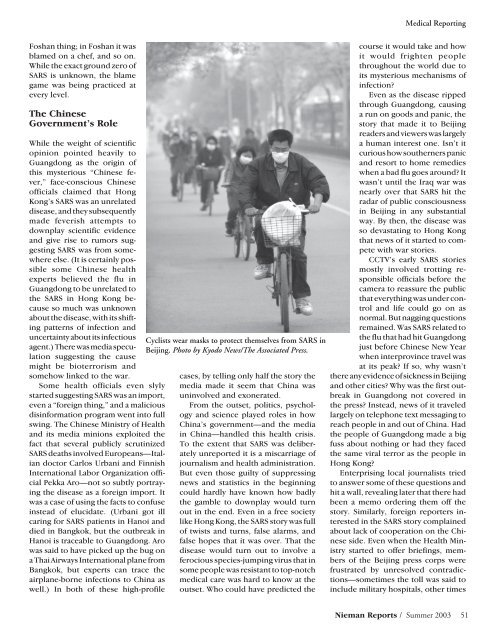summer-2003-Part 2-live - Nieman Foundation - Harvard University
summer-2003-Part 2-live - Nieman Foundation - Harvard University
summer-2003-Part 2-live - Nieman Foundation - Harvard University
- No tags were found...
Create successful ePaper yourself
Turn your PDF publications into a flip-book with our unique Google optimized e-Paper software.
Medical ReportingFoshan thing; in Foshan it wasblamed on a chef, and so on.While the exact ground zero ofSARS is unknown, the blamegame was being practiced atevery level.The ChineseGovernment’s RoleWhile the weight of scientificopinion pointed heavily toGuangdong as the origin ofthis mysterious “Chinese fever,”face-conscious Chineseofficials claimed that HongKong’s SARS was an unrelateddisease, and they subsequentlymade feverish attempts todownplay scientific evidenceand give rise to rumors suggestingSARS was from somewhereelse. (It is certainly possiblesome Chinese healthexperts believed the flu inGuangdong to be unrelated tothe SARS in Hong Kong becauseso much was unknownabout the disease, with its shiftingpatterns of infection anduncertainty about its infectiousagent.) There was media speculationsuggesting the causemight be bioterrorism andsomehow linked to the war.Some health officials even slylystarted suggesting SARS was an import,even a “foreign thing,” and a maliciousdisinformation program went into fullswing. The Chinese Ministry of Healthand its media minions exploited thefact that several publicly scrutinizedSARS deaths involved Europeans—Italiandoctor Carlos Urbani and FinnishInternational Labor Organization officialPekka Aro—not so subtly portrayingthe disease as a foreign import. Itwas a case of using the facts to confuseinstead of elucidate. (Urbani got illcaring for SARS patients in Hanoi anddied in Bangkok, but the outbreak inHanoi is traceable to Guangdong. Arowas said to have picked up the bug ona Thai Airways International plane fromBangkok, but experts can trace theairplane-borne infections to China aswell.) In both of these high-profileCyclists wear masks to protect themselves from SARS inBeijing. Photo by Kyodo News/The Associated Press.cases, by telling only half the story themedia made it seem that China wasuninvolved and exonerated.From the outset, politics, psychologyand science played roles in howChina’s government—and the mediain China—handled this health crisis.To the extent that SARS was deliberatelyunreported it is a miscarriage ofjournalism and health administration.But even those guilty of suppressingnews and statistics in the beginningcould hardly have known how badlythe gamble to downplay would turnout in the end. Even in a free societylike Hong Kong, the SARS story was fullof twists and turns, false alarms, andfalse hopes that it was over. That thedisease would turn out to involve aferocious species-jumping virus that insome people was resistant to top-notchmedical care was hard to know at theoutset. Who could have predicted thecourse it would take and howit would frighten peoplethroughout the world due toits mysterious mechanisms ofinfection?Even as the disease rippedthrough Guangdong, causinga run on goods and panic, thestory that made it to Beijingreaders and viewers was largelya human interest one. Isn’t itcurious how southerners panicand resort to home remedieswhen a bad flu goes around? Itwasn’t until the Iraq war wasnearly over that SARS hit theradar of public consciousnessin Beijing in any substantialway. By then, the disease wasso devastating to Hong Kongthat news of it started to competewith war stories.CCTV’s early SARS storiesmostly involved trotting responsibleofficials before thecamera to reassure the publicthat everything was under controland life could go on asnormal. But nagging questionsremained. Was SARS related tothe flu that had hit Guangdongjust before Chinese New Yearwhen interprovince travel wasat its peak? If so, why wasn’tthere any evidence of sickness in Beijingand other cities? Why was the first outbreakin Guangdong not covered inthe press? Instead, news of it traveledlargely on telephone text messaging toreach people in and out of China. Hadthe people of Guangdong made a bigfuss about nothing or had they facedthe same viral terror as the people inHong Kong?Enterprising local journalists triedto answer some of these questions andhit a wall, revealing later that there hadbeen a memo ordering them off thestory. Similarly, foreign reporters interestedin the SARS story complainedabout lack of cooperation on the Chineseside. Even when the Health Ministrystarted to offer briefings, membersof the Beijing press corps werefrustrated by unresolved contradictions—sometimesthe toll was said toinclude military hospitals, other times<strong>Nieman</strong> Reports / Summer <strong>2003</strong> 51
















